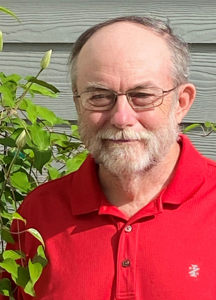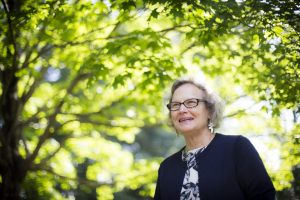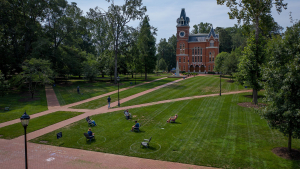By: Rachel Musetti, General Sustainability Intern
When OSI became aware of the impending retirement of Dr. Baker and Dr. Carter, we found it impossible not to reflect on their impressive sustainability legacies. Dr. Baker and Dr. Carter led both Oxford College and Emory University to champion sustainability efforts in the southeastern United States, largely due to their unwavering dedication to biodiversity conservation and their inspiring work to encourage those around them to love the natural world.

Dr. Steve Baker, Professor of Biology, tirelessly worked to instill a love and appreciation for the environment in Oxford students and in the surrounding community. As the Director of the Oxford Institute for Environmental Education, Dr. Baker helped teachers improve science education curricula by integrating investigative learning in K-12 schools for over twenty years. He worked with various groups, ranging from Georgia’s Department of Natural Resources to local schools, to lead workshops, seminars, and presentations on stream ecology and environmental education.
His dedication to experiential science education made Dr. Baker popular among Oxford students as well. His Aquatic Ecology course was always in high demand and involved conducting research all over Newton County. In this course, students learned about their impacts on their local environments, which helped students embody the commitment to “think globally and act locally.” Through his teachings, Oxford students became environmental stewards.

Dr. Eloise Carter, Professor of Biology, has long been regarded as Oxford’s green conscience. In 1986, in tandem with then-professor William “Bill” Murdy, the two documented the rich diversity of vegetation and hardwood forests at Emory in “A Report on the Status of Forested Land of Emory University”, known also as the Murdy-Carter Report. The report served as a reference for many policy decisions regarding Emory’s environment, and eventually led to both the University’s first forest protection plan and the foundation of today’s campus land-use plan.
The Murdy-Carter report was also crucial to the work of the University Senate Committee on the Environment, in which Carter served as a representative. Following recommendations in her landmark report, she pushed for the preservation of the woods and was one of the most influential founders of the No Net Loss of Forest Canopy Policy. A sustainability titan herself, Dr. Peggy Barlett noted that “Dr. Carter was instrumental in Emory’s transition from thinking of woodlands as ‘idle land’ to realizing they’re precious resources for research and teaching.”
Dr. Carter’s efforts on Oxford’s campus are equally remarkable. Carter championed efforts regarding Oxford’s built environment. Oxford’s Dean Moon reflected upon Dr. Carter’s unfaltering loyalty to the forest, sharing that “when any new construction is underway, you can rest assured that Dr. Carter will tour the building site and point out any existing trees that are not properly protected, as well as efforts to manage water run-off.” When the College decided to build the new Oxford Science Building, Dr. Carter and other faculty advocated for a conscientious building design which ultimately contributed to the building achieving LEED Gold certification.
 As a member of the Quadrangle Forest Restoration Committee, Carter was the moving force behind creating a sustainable plan for Oxford’s idyllic quad that featured natural native woodlands on the east and west, with open green space in the center. Dean Moon recalls Dr. Carter as the “champion who developed our landscape palate of plant materials that we now follow when new buildings are planned.” Through her design, Oxford’s quad created a canopy and understory that would replace the dying canopy, mimicking a natural forest. Moving from the quad to the Hearn Nature Trail that encircles Oxford’s campus, Carter recruited work-study students, sports teams, and volunteers to remove Chinese Privet and Kudzu, two notorious invasive species, from the forest. Her work at Oxford compelled the University to set a goal to remove all invasive species from campus woodlands.
As a member of the Quadrangle Forest Restoration Committee, Carter was the moving force behind creating a sustainable plan for Oxford’s idyllic quad that featured natural native woodlands on the east and west, with open green space in the center. Dean Moon recalls Dr. Carter as the “champion who developed our landscape palate of plant materials that we now follow when new buildings are planned.” Through her design, Oxford’s quad created a canopy and understory that would replace the dying canopy, mimicking a natural forest. Moving from the quad to the Hearn Nature Trail that encircles Oxford’s campus, Carter recruited work-study students, sports teams, and volunteers to remove Chinese Privet and Kudzu, two notorious invasive species, from the forest. Her work at Oxford compelled the University to set a goal to remove all invasive species from campus woodlands.
Beloved by students and staff alike, Dr. Carter worked to ensure that these protected forests were cherished by all. As one of the main faculty who led Wood Walks for the Piedmont Project, she invited anyone and everyone on walks through Hearn Nature Trail and around the Oxford campus to help “awaken to place.” Although Dr. Carter wasn’t the only docent, she made a point of “grounding people in place, orienting them to the geology, geography, and primary plant systems, while making key connections to anthropogenic impacts”, Dr. Barlett recalled. Her impact extended beyond Oxford’s boundaries to the local school districts, where she is credited with helping build the sustainability movement. During the summers, Dr. Carter, Dr. Baker and other faculty taught a nationally recognized two-week course for K-12 educators through Oxford’s Institute for Environmental Education.
Dr. Carter was also one of Oxford’s most highly demanded faculty, especially for her Field Botany course. The class is famously taught entirely outdoors, where students are encouraged to “talk to the trees” and learn “botany by the nose.” Kate Bachman, a former student and Teaching Assistant for Dr. Carter’s Field Botany course reflected fondly on her experiences with Dr. Carter, sharing that “she taught us to pay attention in the outdoors, to notice the rich variety of the plant world, and to better appreciate the thrill of its incredible beauty. Her joy and fascination with the subject were contagious and showed through in her method for teaching the course.”
Both Dr. Baker and Dr. Carter leave the University in a more sustainable place, and for that we are forever thankful. As Dr. Theodosia Wade commented, “[The Oxford] Forest has lost two champion trees and it’ll take a lot of little trees to take their place.” We wish them fulfilling and nourishing retirements.
